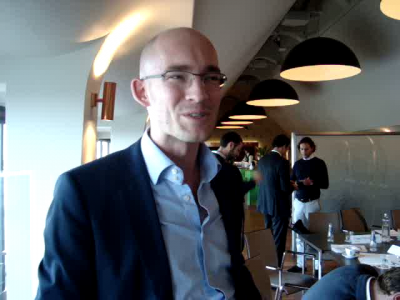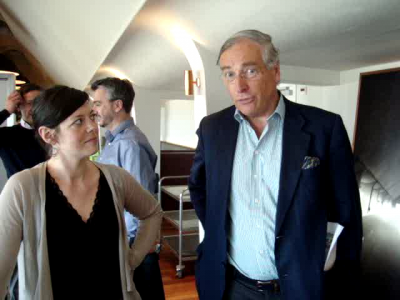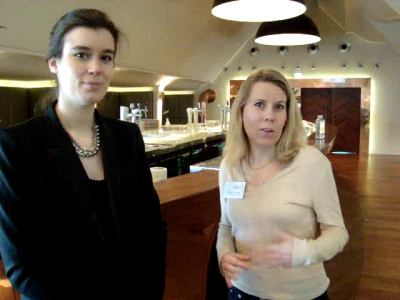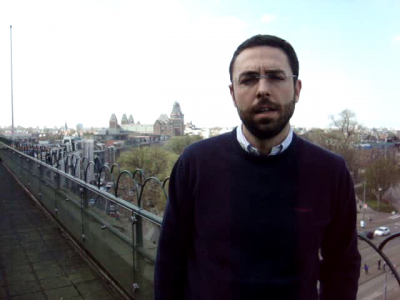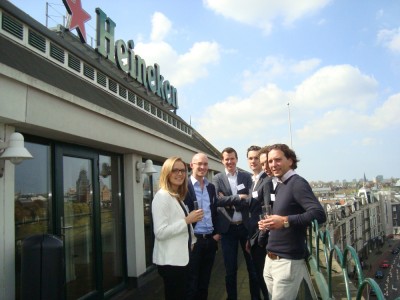
What an extraordinary amount of learning, thinking, debating and networking you can fit into 24 hours! On April 4 and 5, 2014, twenty-one young Europeans from different countries and different professions gathered in Amsterdam for a short, intensive seminar on Europe and the issue of skilled migration. They briefly admired the grand view over the canals of Amsterdam from the top floor meeting room at the Heineken Experience. And then, they set to work.
Skilled migration, in fact, has many aspects. The free movement of labour is enshrined in the EU treaties. Europe’s cititzens consider it one of the most important benefits of European integration to be able to move anywhere in the EU for work without having to seek permission. In the context of the Euro crisis, labour mobility has also helped reduce imbalances on the labour market which can no longer be addressed by currency fluctuations.
Balkenende and Grossmann
Yet mobility isn’t necessarily a winning proposition for everybody. In countries with skills shortages there is an immense interest in recruiting missing experts – engineers, scientists, computer experts- in order to foster growth. In contrast, in the countries of origin there is a deep fear of a brain drain, which may hurt these countries’ economic future. But while the exodus of Spanish engineers and Portuguese nurses has hit the headlines, the much more massive brain drain from countries in Eastern Europe, especially Poland, Bulgaria and Romania, has received comparatively little attention.
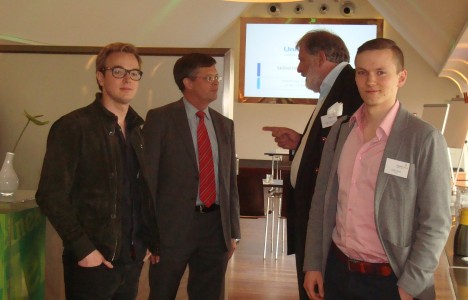
The Amsterdam seminar began with a prominent speaker: Jan Peter Balkenende, former Prime Minister of the Netherlands and now partner at Ernst & Young, gave an outline of developments in Europe, his views on the issue of sustainability and his conviction that people in Europe need to develop a more of a winning attitude. Balkenende was lively, speaking without notes, walking around the room and challenging participants to answer questions. With such a jump start, participants didn’t even get to hold a round of introductions until the next day.
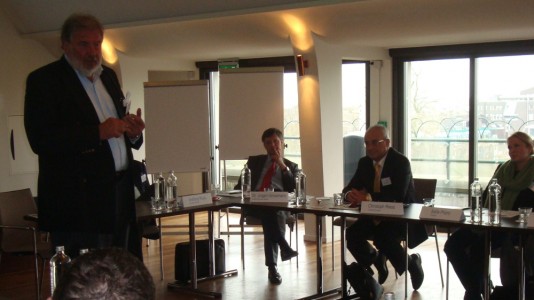
Next was Jürgen Grossmann, a German entrepreneur and owner of the steel group Georgsmarienhuette Holding, who spoke about different generations’ outlook on Europe and his own passionate belief in Europe. Grossmann, who serves as treasurer at United Europe and is one of the founders of our initiative, is an impressive figure who clearly enjoyed the discussion. He stay on for dinner, too, returning to Hamburg late in the night.
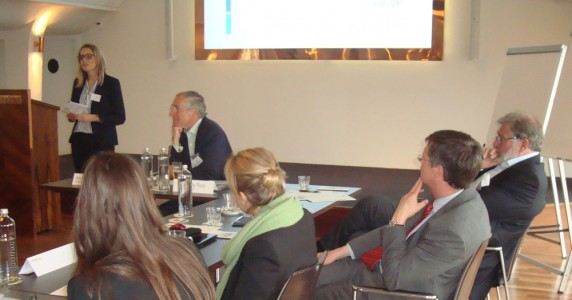
Work continued with the first contributions from participants. Cora Domnick, a young German, explained how her employer, a major hotel group, needs to create a work environment that is welcoming to many different cultures in order to recruit and retain staff willing to work the often difficult hours in this business. While this is comparatively easy for five star hotels because of the prestige of working there, simpler hotels face a real challenge.
Is migration a zero-sum game?
Maleachi Bühringer, also German, who owns and runs an industrial company in southern Germany, spoke about Switzerland, where he studied. Switzerland does very well in attracting talented and well-educated people away from the EU. It does so because wages are high, taxes are low, unemployment is nearly non-existent and clear and easy rules have been set up for immigrants. To make the issue more tangible, Bühringer passed around his own Swiss resident’s pass.
The positive example was followed by a negative one: Nais Tirole gave a short and depressing review of the misery of her native France: inflexible labour laws that make it so difficult for the young to find a proper job that many of the most talented French people have left the country. Add to that legislation that forces students to do at least part of their work in French, and you have a country that has hobbled itself in the competition for talent.
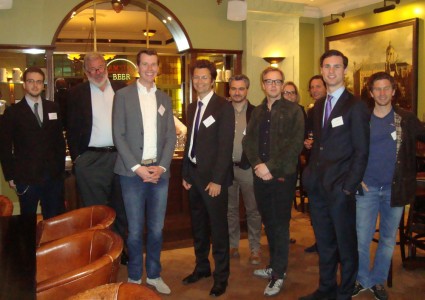
But how exactly does this matter in the European context? Is skilled migration in the EU a zero sum game, where one country’s gain of an expert is the other one’s loss? Or do we all stand to win together? Quickly, a lively debate was underway that lasted until drinks (for most the deliciously fresh beer served at the Heineken Experience) and dinner.
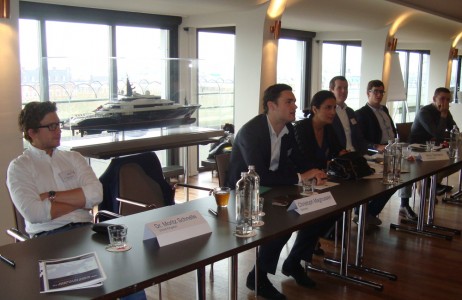
And a fine dinner it was, too, at which Juergen Grossmann took the opportunity to thank Heineken as well as Oceanco, a Dutch shipbuilding company specialising in large luxury yachts, for their generous support of the Young Professionals Seminar. Oceanco had even brought in a large model of one of its motor yachts – a beautiful boat that was much admired. The company also sent Paris Baloumis, a smart young marketing expert of Greek origin, to take part in the Young Professionals Seminar.
Well-educated and highly-skilled young professionals – like those attending the United Europe Seminar – are welcome almost everywhere in the world. Where poor migrants take on terrible hardship in order to earn a better living, highly-skilled experts can freely choose their destination based on career opportunities, living standards or even the proximity of their new workplace to beaches or skiing slopes.
On the doctors’ circuit
It was Maria Vincenza Desiderio, policy expert at the Migration Policy Institute Europe in Brussels, who kicked off the Saturday session with a presentation on the facts and figures of migration within the European Union. Her charts and graphics, put together especially for this seminar, show what impact EU enlargement and the Euro crisis have had on people moving to other countries.
Work continued with United Europe’s project directors Bettina Vestring and Christoph Riess moderating and keeping time. Nikolaus Luft, an eye surgeon from Austria, explained how young eye doctors are helped by a European association if they want to move to other European countries for a stint in research. In contrast, there is no such helping hand for young farmers, Alan Jagoe from Ireland said. Though many of Europe’s farmers are well beyond retirement age, there is no institution that matches them with young farmers looking for land. Yet much of the world depends on Europe continuing to produce surpluses of high quality food.
Europe’s hospitals provide another negative example, said Moritz Schnelle, a doctor doing medical research at King’s College in London. Many German doctors are hired by Swiss hospitals. To fill the vacancies they leave, German hospitals hire staff from Eastern Europe – doctors who despite the required language test sometimes do not speak enough German to be able to communicate with their patients. They, in turn, are sorely missed in their countries of origin. In Romania in particular, the lack of medical staff has become acute.
Poland’s example of brain waste
Discussions continued with Salla Pöyry’s short presentation on the economic effects of brain drain. What this Finnish economist told the audience was that skilled mobility is driven by economic opportunity and higher productivity. Brain drain has negative, but also positive effects on the country of origin. After Salla, the seminar continued with personal testimonials. Manuel Gonzalez Igual from Spain gave his view of how young Spaniards go abroad to escape the shockingly high youth unemployment.
Unemployment in Spain would be considerably higher if they didn’t. And this isn’t just true of Spain, but of the other Southern European countries as well. Lisa Stasi, an Italian chemistry expert, set out her ideas and findings about why young people leave their homes. Her country man Paolo Cecconi, a specialist in the classical languages, has made that jump himself, working at the University of Würzburg in Germany.
Will emigrants return once their country of origin emerges from the crisis? The Polish experience suggests that many of the emigrants never come home. Poland, EU member state since 2004, has experienced an exodus of workers, many of them with very high qualifications. And as Pawel Pokrzywinski, a Polish engineer working for a Japanese company in Germany, told participants, only a fraction has ever returned home. Income differences, of course, are still considerable between Poland and Germany or the UK.
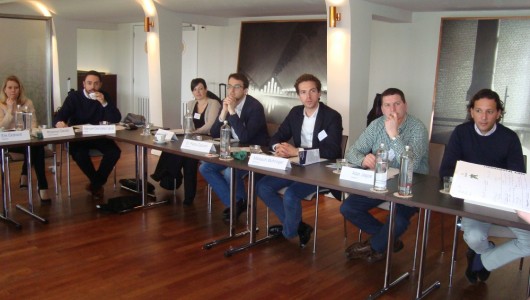
Discussions continued in three working groups which debated on how to improve mobility and how to mitigate the negative effects mobility may have. With time at the seminar in short supply, only one hour was allotted to the working groups. Many participants said later that this had been too little– but isn’t it really a very good signthat discussions were so interesting and lively that people felt they should have had more time?
A bleak picture of Romania’s future
None of this would have been possible without Anthony Ruys, the former Heineken CEO and founding member of United Europe, whose idea the seminar had been. It was Ruys who first came up with the idea of organizing an event involving the younger generation. He supervised the preparations, invited Jan Peter Balkenende and secured permission for United Europe to use the rooms at the Heineken Experience. Throughout this first Young Professionals Seminar, Thony Ruys was present and active in the discussions.
Of course, Ruys has always been very interesting in younger people’s thoughts and ideas: “The current generation of leaders in Europe is committed to a united Europe for reasons of history: never before did Europe enjoy such a long time of peace and prosperity”, he explained in the invitation to the seminar. “But we want to hear what the younger generation believes about Europe. What does Europe need to do to address their needs? What could re-kindle enthusiasm for the European idea?”
How Scotland and the EU are linked
Lunch on Saturday was really short – with a 4 pm deadline, nobody wanted to take much time out. Work resumed with a presentation from Vlad Voiculescu, a Romanian banker working in Vienna, who drew a bleak picture of Romania’s future. With a massive exodus of talent, the future looks dark to those who forced to stay behind. There is a particular demographic time bomb ticking away in Romania, too. The dictator Nicolae Ceausescu in the 1960s had banned both birth control and abortions in an effort to make people have more children. In 15 or 20 years, when the generation born then needs to retire, Romania faces an even greater social challenge.
Politics dominated the afternoon: Henk Sierksma from the Netherlands spoke about the rise of Geert Wilders’ populist and anti-European party and how Wilders’ movement has changed his country for the worse. Rhiannon Davies explained the issues ahead of the EU referendum planned for 2017. But before that, the Scottish will vote on their – and Davies, a competition lawyer from London who has spent a lot of time in France, very much hopes that they decide to stay in the UK. As she explained, they are much more pro-European than the English, and if the referendum on Europe really did take place, they could swing the vote in 2017.
Iannis Krontiris explained the atmosphere is his native Greece where the crisis is still looming very large. And Düzen Tekkal, a second generation immigrant to Germany of Kurdish roots, explained how her family’s history has led her to a strong belief in European integration.
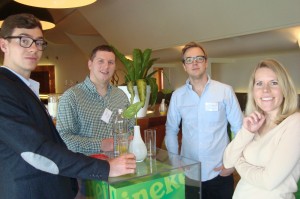
Conclusions
In their conclusions, United Europe’s young professionals showed themselves to be very pro-European. Mobility, they said, is absolutely needed. And though there are some drawbacks, the many positive aspects prevail. Creating clusters in certain industries will help Europe as a whole – after all, nobody in the United States squibbles that Silicon Valley may be drawing away talent from Ohio or Florida.
Hurdles to mobility remain, the most important being the fact that Europeans don’t easily understand each other. Particularly in southern Europe, the teaching of English needs to be dramatically improved. Participants noted the positive example of the Netherlands, where nearly everybody seems to be speaking the language fluently. The cost of learning English, Christoph Magnussen von Germany said, doesn’t need to be prohibitive in this day and age of high quality online lessons that are available for free.
Education is also important for teaching Europe’s children about the values we share, the Finnish management consultant Jussi Herlin said. History lessons should be expanded to the events that have shaped other European countries, an issue that was particularly important to the Dutch university student Marijn Goossens. “It is very interesting how diverse and different Europe is,” added Erik Ekstrand, a Swede who works as chief financial officer in a startup company he has co-founded in Stockholm. “To me, it really was a bit of an eye opener.”
Companies should create a welcoming atmosphere for workers from other countries, but this cannot be done through government regulations. With the demographic change setting in, it will be any employer’s own interest to attract talent anyway. Setting up hiring platforms could be a good idea. Mostly, however, it is up to national governments and the EU, however, to foster mobility. This is the list of tasks that participants drew up:
- Harmonize professional standards, credentials and requirements
- Set clear requirements for labour-based immigration
- Make sure they have a helpful immigration administration
- Improve the framework for family migration and integration policies, including bilingual schools
- Provide incentives to provide an acceptable minimum level of healthcare everywhere in Europe
“As a group, we are very much an example that migration is a part of us,” Thony Ruys said to conclude the workshop. “You are Europe’s future leaders, and we hope that you will stay in touch with each other and with United Europe.”
And then, it was time for United Europe’s first group of young professionals to say goodbye. 24 hours, however much you fit into them, are still only 24 hours.
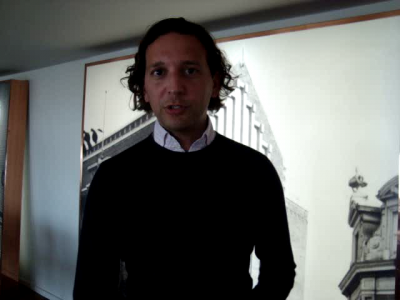
Listen to the statements from some of the participants:
